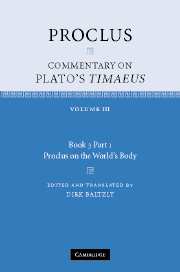VI - The Sixth Gift of the Demiurge: A Motion Appropriate to Intellect
Published online by Cambridge University Press: 30 June 2022
Summary
For he assigned it a motion appropriate for its body – of the seven [kinds of motion] the one that is particularly relevant to intellect and wisdom. (34a1–3).
Theoria
Among the ancient philosophers, some supposed that the cosmos reverted upon the intellect and credited its motion to the love of this primary object of desire, and said that nothing goes down into the cosmos from the intellect. In this manner they deprived intellect of its capacity to be productive and gave it a status equivalent to things that fill us with desire to see them. But such things have no capacity to engender anything in virtue of their own natures [as visually appealing objects]. Now others among the ancients agreed that intellect or soul or whatever it was above the world did something to it, but they did not grant motion to the cosmos as something innate and appropriate, and instead said that it was led to revolve in a circle only extrinsically. This latter view is one Aristotle knocked on the head as a theory that destroys the everlasting character of the universe: for that which happens by force is not everlasting.
But Plato, on the other hand, has been saved from both of these kinds of mistake. He gives motion to the cosmos as something innate and appropriate and also provides evidence of its demiurgic cause. This motion is the sixth demiurgic gift to the cosmos (cf. II. 5.24 ff.) – a motion that imitates intellect and which we say it has both in virtue of itself and also from the father. For the word assigned sends us back up to the paternal cause (for that from which the universe gets its being (ousia) is also the source of its natural motion). But a motion appropriate for its body refers to the distinctive nature of the cosmos through which it motivates itself to move in this fashion by its own agency. For it has a certain self-motion in virtue of its life, and in virtue of its shape (which is spherical) it has something appropriate to circular motion.
- Type
- Chapter
- Information
- Proclus: Commentary on Plato's Timaeus Volume 3: Book 3 Part 1: Proclus on the World's Body , pp. 153 - 165Publisher: Cambridge University PressPrint publication year: 2007



